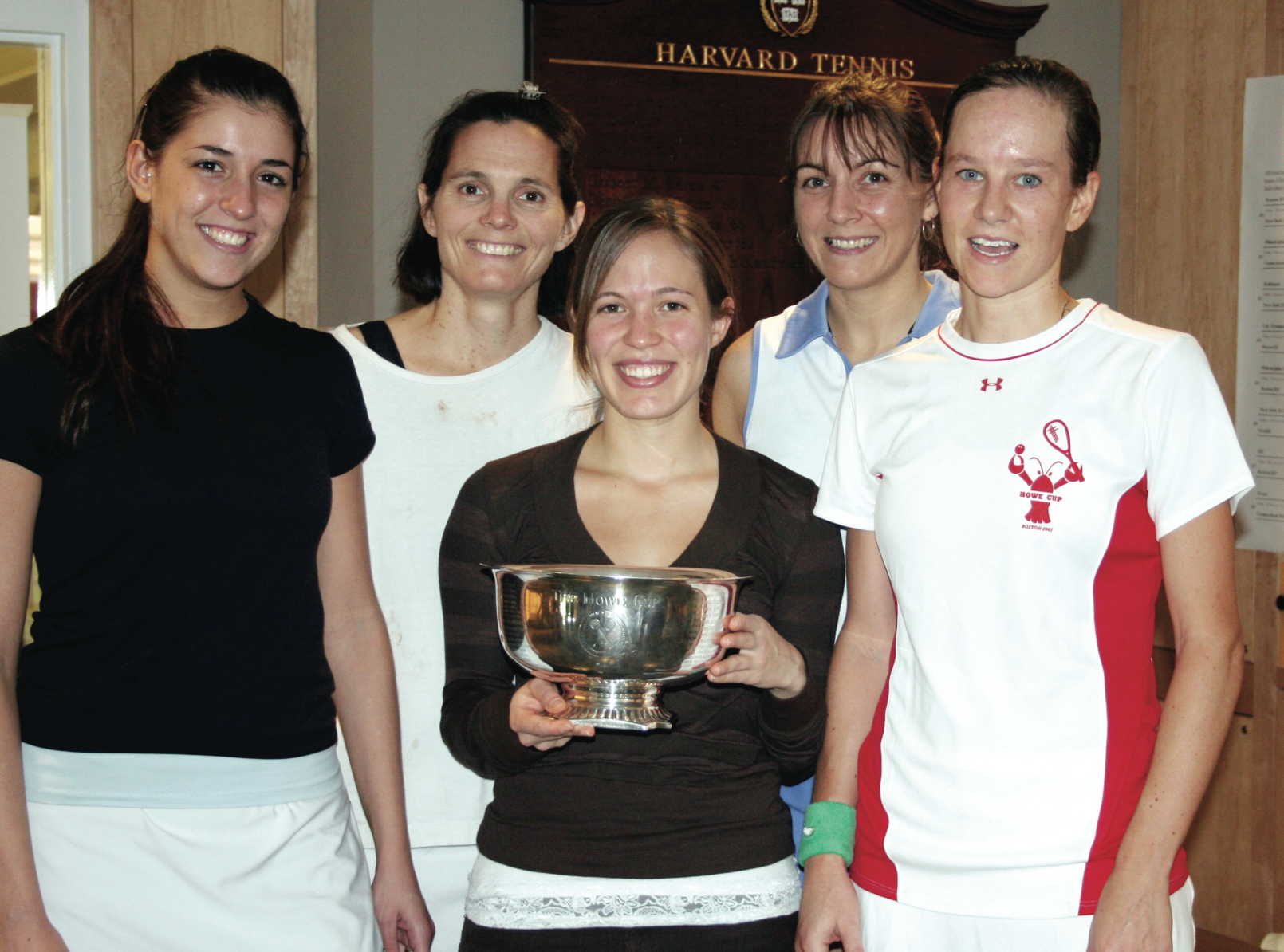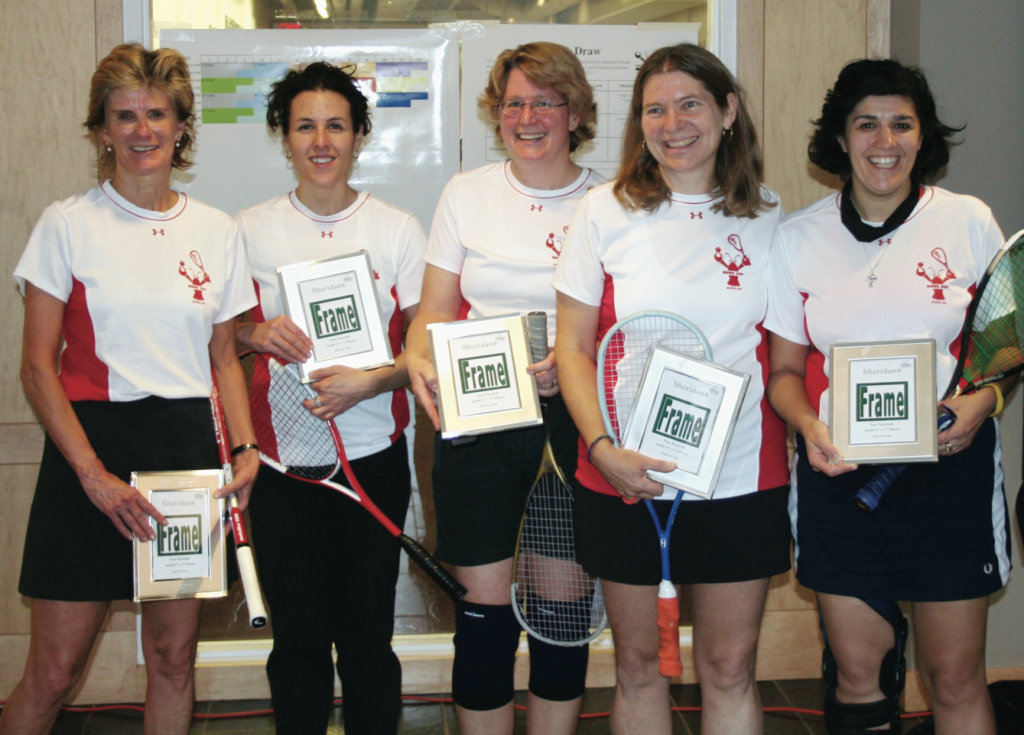
By Beth Rasin
Photos by Beth Rasin and Chris Smith
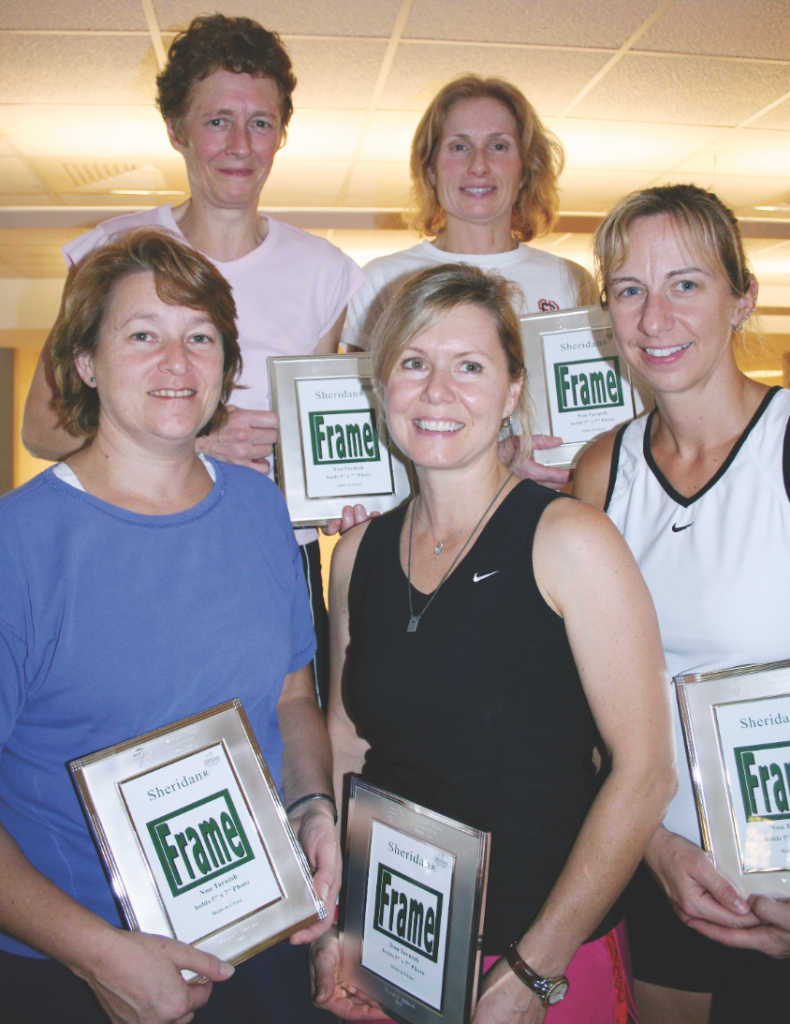
“Babies and knee braces,” said Bridget DiBonaventura as she surveyed the bustling activity, including numerous children clambering across the bleachers, across the 13 courts at Harvard’s Murr Center. It was the 52nd playing of Howe Cup, the women’s national team championship and Bridget was talking about her strategies for pulling together her team each year for the sport’s preeminent and most popular women’s squash event. “I have to think about those things when I start putting the Connecticut team together—who’s pregnant and who’s recovering from surgery.”
Squash-playing Moms as well as veteran players dealing with the vagaries of age—who often don’t travel to compete in any other squash event—find the time and the will to train so they can participate in Howe Cup. The end result? Boston entertained a record 211 women players of all ages and all levels of play who did not want to miss the camaraderie of team play and the “squash till you drop” format that are the trademarks of Howe Cup, not to mention the now fabled Saturday night dance party.
A record number of entrants and teams meant that more than 750 singles matches were played during the three-day tournament weekend which began Friday morning at 8:30 AM—and each player competed at least four times. Still standing on Sunday afternoon, and leaving Beantown with the Howe Cup bragging rights for the next 12 months were….
Boston A1 With three players returning from last year’s championship team, the Boston A1 team was a Howe Cup juggernaut. In four team matches over the course of the championship, only one Boston player lost her individual match and the team won 18 of the 19 other individual matches without dropping a single game! Although Philadelphia A1 was also undefeated in pool play, Boston overpowered them in the final, winning 4-1. Philadelphia left the courts at Harvard’s Murr Center already focused on next year’s battle for the Cup, which will be played on their home turf at the newly opened Fairmount Athletic Club.
Connecticut B2 The 16 team B draw provided the only true dramatic finish of the weekend. It was the very last players on court who determined who would clinch the Cup. Displaying her trademark competitive grit, Jane Segall secured the win for Connecticut with a 3-0 victory over Seattle’s Katherine Grant. Both teams came to the courts with trash talking fashion statements. Seattle’s logo was “More than just pink thongs” while the Connecticut women’s T shirts boasted: “We are the squash players that your mother warned you about.”
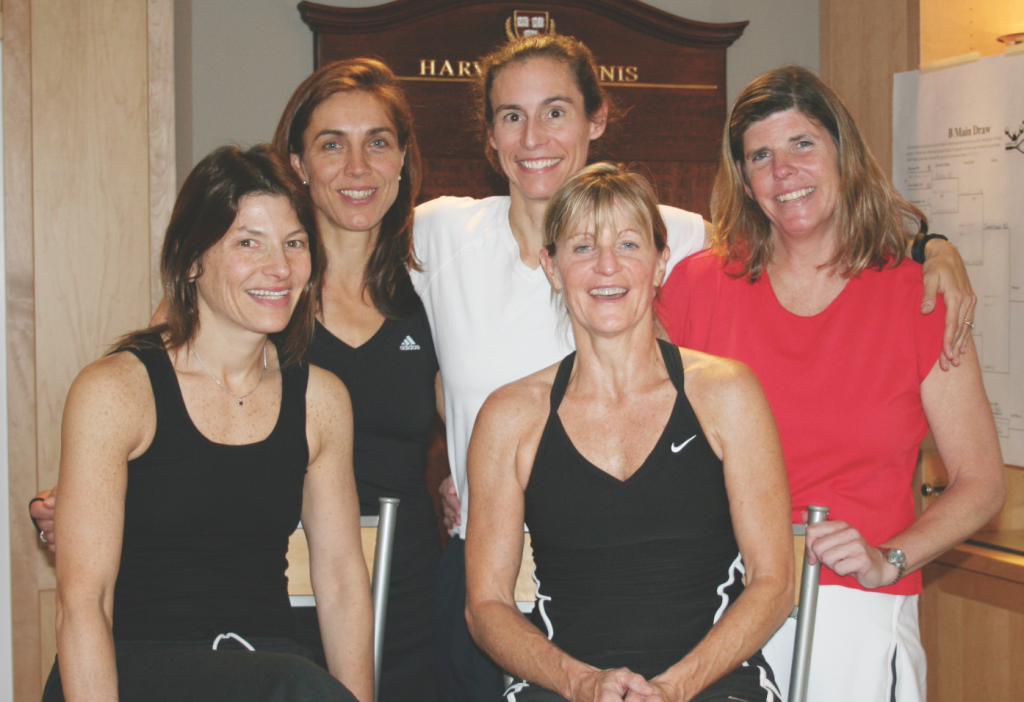
New Jersey C New Jersey swept through the 11 team C draw, finishing the weekend with a perfect record and the championship. A runner-up in the C finals last year, the Garden State squad was undefeated in pool play and then beat Portland and Boston C2 to take the trophy home. “These women are really good,” Jane Segall said admiringly, as she watched some of the match play, echoing the sentiments of many of the higher level players who were impressed with the high quality of the C flight’s competitive play.
Boston D1 Both Boston D1 and Baltimore were undefeated going into Sunday’s final match. Prepping for the championship match, Baltimore’s Debbie Ehler scouted the Beantown five and reported back to her team that “they hit lots of lobs and are a solid team.” The finals proved Ehler to be an accurate scout; the Bostonians hit lots of lobs and secured the Cup with a 4-1 victory.
All but one player on the Boston team were playing in the event for the first time and they were thrilled that a D flight has been added to the competition. “It means players like us can play and no one gets slaughtered,” said Debbie Harrison. “It is great to be able to experience the camaraderie here.” Teammate Colleen Philimore added. “It’s nice to see the 70-year-olds still playing—it gives us hope.”

Doubles Baltimore’s Nancy Cushman and Pat Wong came out on top in the doubles draw defeating Boston’s Mary McKee and Robin Grace, 3-1, in the finals. The Baltimore duo was undefeated in pool play and eliminated Libby Welch and MarieVlcek in the semifinal playoffs en route to the title.
A Spirited Senior …
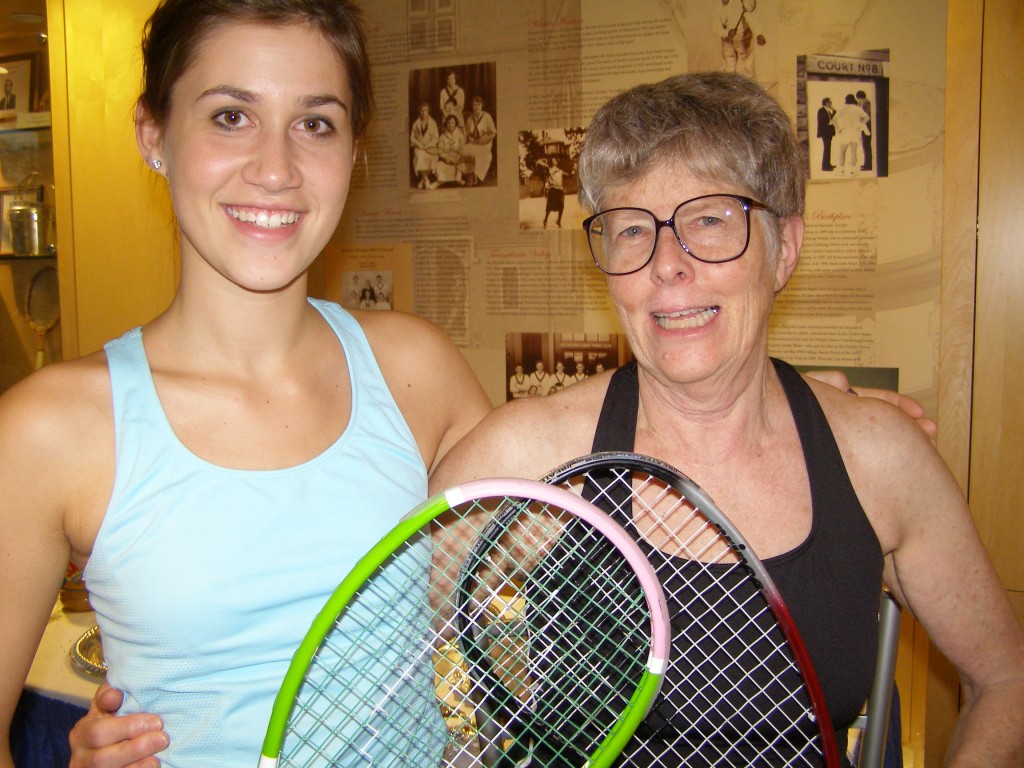
“Each of us inspires the other,” says 70-year-old Barbara Beckwith, a member of Boston’s C team who was the tournament’s oldest competitor. She recalls that in her youth, when athletic attire for women consisted of bloomers and pleated skirts, sports for women were not taken seriously. But that is not the case at Howe Cup. “I love seeing all these vigorous women who were not valued when I was growing up in the 50s.”
Although there were squash courts at Wellesley, Beckwith’s alma mater, it wasn’t until after college in the late ‘70s that she was introduced to the sport. Beckwith was on her way to workout in the swimming pool at Harvard University when she saw her first squash court. “It was love at first sight,” she says. “I gave up tennis and snuck onto the courts at Harvard’s Adams House to play whenever I could.” Eventually, in 1993, she joined the Mt. Auburn Club.
Beckwith limits her time on court these days to three sessions per week. “It is a little bit painful for me,” she confesses. Her other concessions to age? “More lobs and trickier strategy,” she says with a big grin.
A journalist by profession, Beckwith has written several articles on squash including “Meditating at High Speed,” her description of the peacefulness that she finds is part of the mind game that accompanies the sport’s speed and action. And it was her profession that brought her to her first Howe Cup. “Many years ago, I was going to the tournament to cover it, and one of the teams needed a player,” she recalls. “So I jumped right in.”
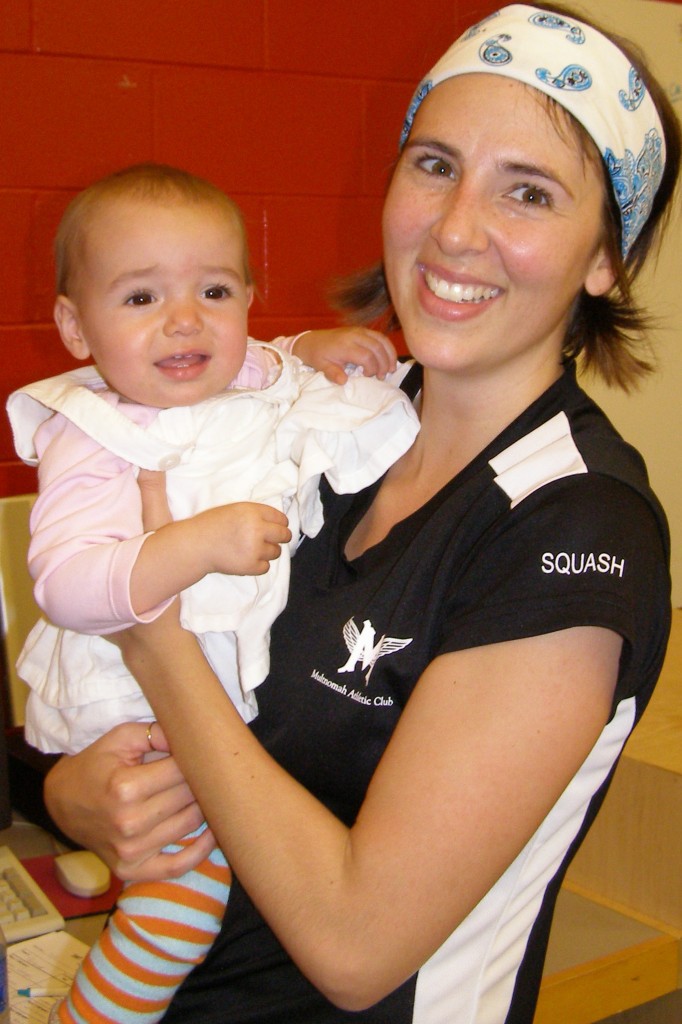
Beckwith’s second Howe Cup experience has been terrific. “For me it’s about having a good time on court,” the vigorous Bostonian says. “So I’ll give advice to my opponents.” She also enjoys the personal connection and getting to know the other women with whom she’s playing. And she’s particularly delighted with the mix of players. “I love that there are 14-year-olds playing here and that more levels of play have been added, particularly as I get slower,” she exclaims with a youthful energy that belies her age.
And a Fabulous Freshman
Baltimore’s 14-year-old Erin Goluecke was playing in her first Howe Cup for her hometown’s B team, just a week before she would try out for the Roland Park Country Day School team. “It’s a lot of matches,” she answered when asked how she was enjoying the weekend. “I have never played this many matches before.”
Erin, who picked up the game by playing with her Dad, likes squash because “it is a game you play for yourself,” she observed. “I also like the shotmaking.” The difference between playing juniors and the Howe cup women was obvious to her. “The women here play at a slower pace,” said Erin “and they play a smarter game.”
Even though she was too young to attend the famed Saturday night party (she and two other young friends on the C team went out to dinner instead), Erin enjoyed her initiation into Howe Cup. “The team has already asked me to come back and play next year,” she said proudly.
Lone Star Ladies
“I had two friends in Boston whom I wanted to visit,” said Suzy Willis, recounting how Howe Cup’s lone Texas team came to be. So Willis enlisted fellow Houstonians Signe Hovem and Sylvie Desjardins to join her on a trip to Boston for the tournament.
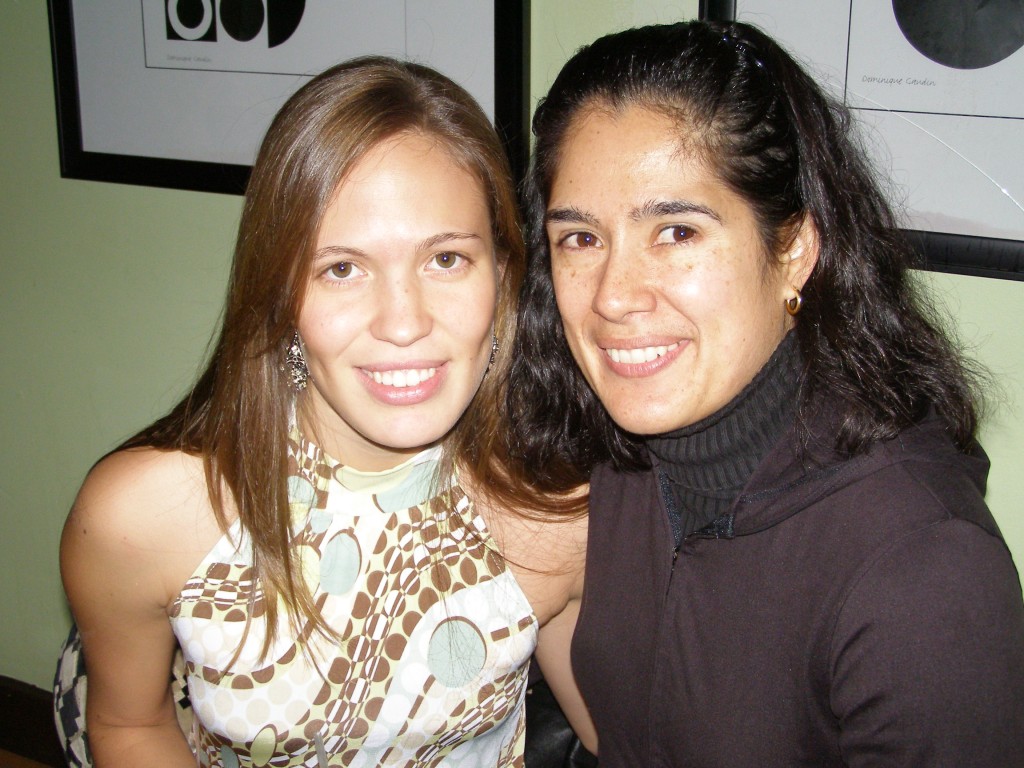
With the nucleus of the team in place, Dallas’ Sapna Sudhir was recruited when the Houston trio met her at the Texas Open. “Our strategy was simple,” said team captain Desjardins. “Any player whose first name began with an S automatically made the team.” The strategy wasn’t easy to execute to completion; their fifth player, who lived in Calgary but visited Houston often on business and played squash at the Met, was Catherine Irvine. “We tried to persuade her to change her name to Scatherine, but she wasn’t interested,” Willis said. Catherine was interested, however, in playing squash with a Texas team, so the Lone Star ladies started preparing for Howe Cup.
The Texas contingent came to Boston prepared to play; they had several practice sessions together before heading east. They brought their rails and cross-courts and a posse, but no Texas drawl. Willis, who has played squash for 10 years, is originally from Newcastle, England. Hovem made her way to Texas from Colorado. Desjardins, a Montreal native, learned the game in Houston from a coworker whom she later married. Sudhir, whose birthplace is Banglor, India, picked up squash when she moved to Dallas three years ago. The team members’ disparate backgrounds were irrelevant in the shadow of their passion for squash and the unifying energy of Howe Cup.
“Women’s competition in Texas isn’t that deep, so to come here and see 211 women in one event is mind blowing,” said Willis. “It’s inspiring to see all the women who play squash in this nation.” The Texans were particularly impressed with the Howe Cup hospitality. “Boston has really raised the bar,” said Hovem admiringly of the management of all aspects of the championships.
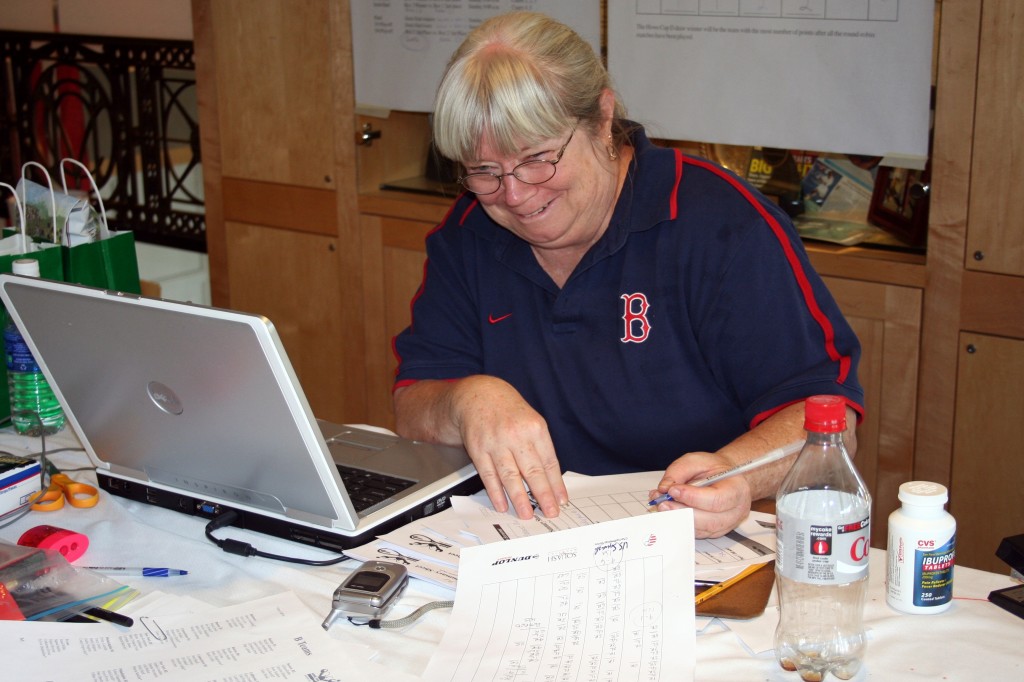
The Howe Cup experience was a humbling but motivating and inspiring experience for the Texans, who didn’t win a match. “This has just whet our appetite and made us better players,” declared Sudhir. “Next year we are going to win a match in the Bs!”
Another Year; Another Howe Cup Adventure
This year, I got the call a week before Howe Cup from the tournament chair. “I didn’t see your name on any of the team entries,” Meredith Johnson said. “The Twin Cities just lost a player because of an injury and they are looking for a replacement. Would you play?”
Just as last year, when Baltimore’s Anne Watson had called me the night before to see if I could step in, I paused. I hadn’t been on a singles court since last Howe Cup, and I was a year older and more out of shape. But the allure of Howe Cup was irresistible. “Sure. Count me in.”
Unlike last year, I did get on a court for a 45-minute practice session the day before my first match. Within five minutes of the boast-rail drill, I was gasping for air. But I did manage to hit a few bona fide winning drop shots in the practice game against the young Egyptian pro who had a PSA ranking. Thus armed with a false sense of confidence, I headed to Boston on the Greyhound bus.
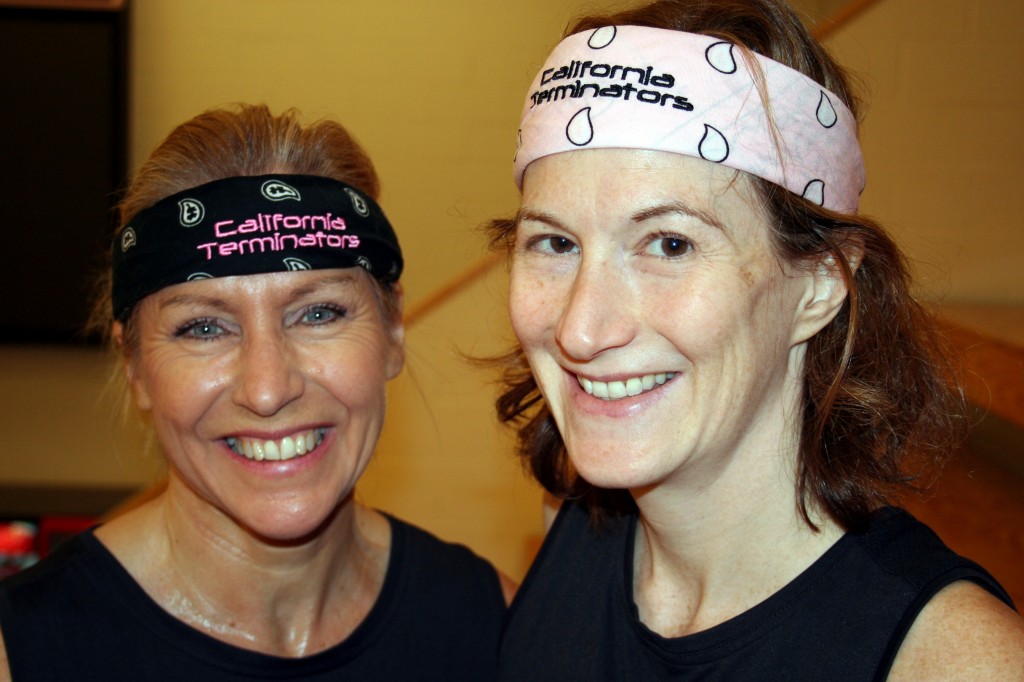
My Minnesota teammates were sound asleep when I arrived at the hotel, but they greeted me with great enthusiasm as we headed out to the Murr Center the next morning for our 8:30 AM match against the Boston C2 team. As the No. 1 player, I was the last match of the lineup to be played. When I stepped on the court, our team was down 1-2 in matches. So it was the “do or die” moment—the must win to secure victory for our team—the heroine-making moment. I quickly dropped the first game, but came back from a huge deficit in the second to get close to winning the game, buttressing my confidence that I could pull out the match. I remembered last year’s Howe Cup when I had come back from being down 0-2 to win the first of four matches. But hot courts, feeble foot speed (none really) and too many errant lobs precluded the possibility of savoring victory. Our No. 2 Nicole Kirchof had kept Boston veteran Elaine Apostilides off balance to even the match score. So my 3-0 loss to Deborah Carr meant that my team was on the minus side of the scoreboard. I was bummed, but not completely despairing. I knew that Howe Cup’s round robin format offered opportunities for redemption.
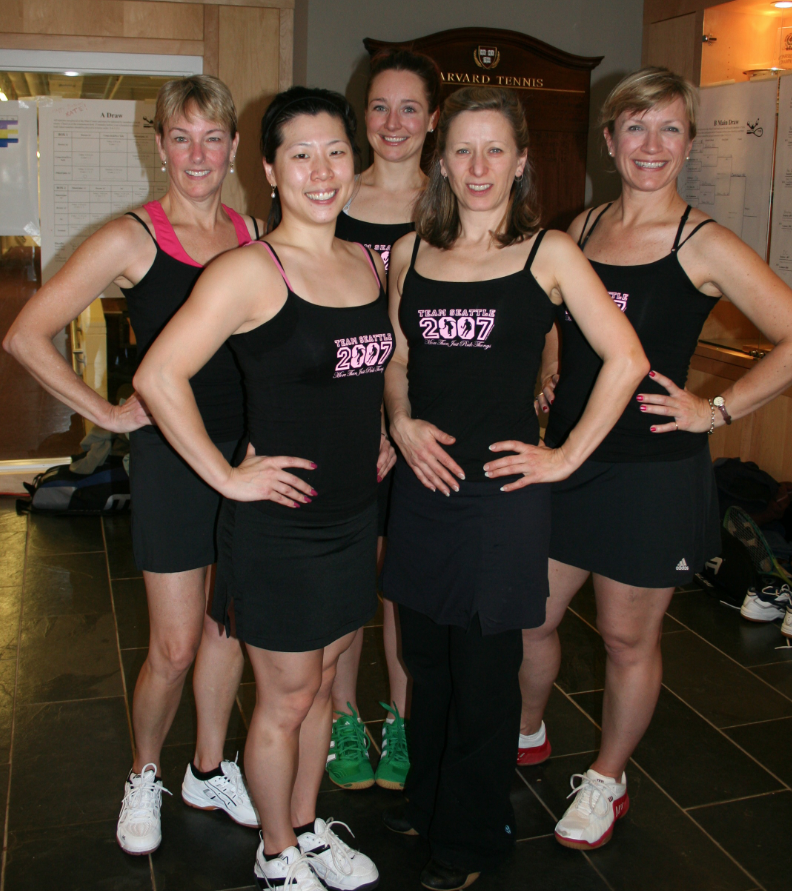
In the “squash until you drop” mode that is Howe Cup, our next match was scheduled for 11:50 AM. I headed towards the locker room for a quick shower to get me back on track for my next match. But I had to walk past all the courts and bleachers to get to the locker room and I never made it to the showers. There were so many familiar faces, so many squash friends to catch up with, that by the time I made my way to the far end of the courts closest to the locker room, it was time for my next match.
Turned out that I didn’t need a shower for my first taste of redemption. I won my match against Philadelphia’s Rebecca Keller, although the pressure was off by the time I played because we had a 3-0 lead. Victory was sweet nonetheless. I do love to play, but it still is more fun when you win.
By midday, the Murr Center was crackling with energy. So many “old-timers” renewing acquaintances, so many first timers enthralled with the variety of depth and play, so many teammates scouting next round matches, so many players checking out team uniforms and slogans.
US Squash CEO Kevin Klipstein was in the house for his first Howe Cup. “I had no idea,” he said as we crossed paths. “This is really impressive.”
Saturday morning was another 8:30 AM start. Portland’s Ellen Zaharchuck kept me in the back of the court to face another 0-3 loss. But at least it wasn’t the margin of defeat for my team. Although our team hadn’t won it didn’t keep us from celebrating teammate Amy O’Brian’s first win of the weekend as she notched our only victory. Unfortunately, our team captain, Anna Masellis, suffered an early end to her match play as a severe muscle spasm forced her out of competition for the remainder of the tournament.
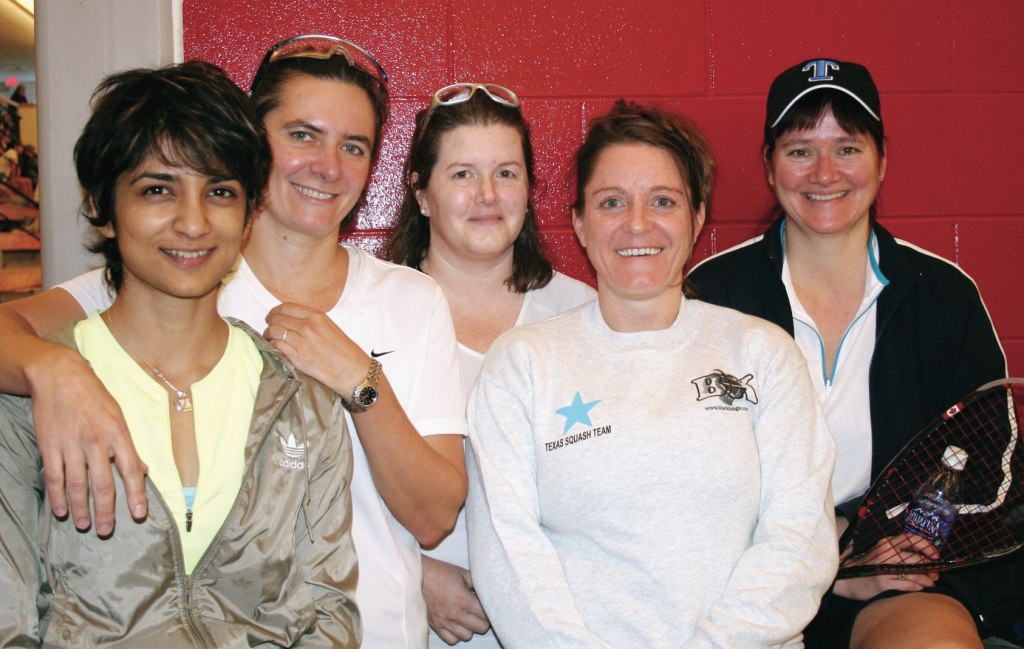
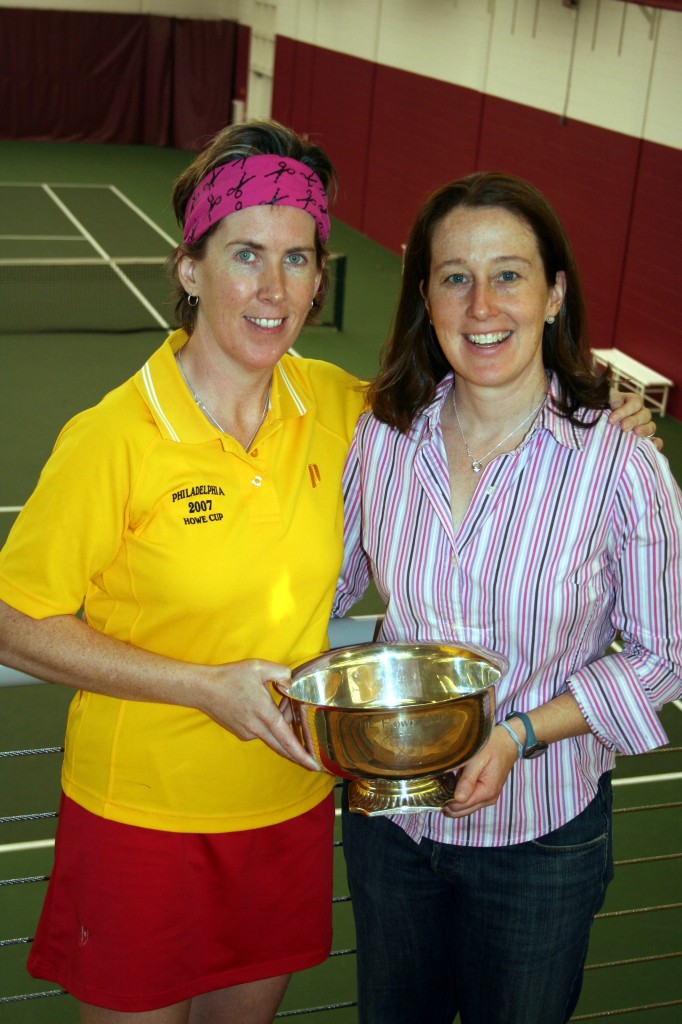
Our last chance for a spot in the playoffs came in our 4:30 match against Boston C2 on Saturday. With the injury forfeit, we started off behind, and when I got on court we were down 1-2; if Amy and I both won our matches we could pull it out. Even after Amy lost a valiant five gamer, I was determined to end my weekend with a victory. (I have always figured that a squash weekend is a competitive success if I have a .500 record at the end of the tournament.)
I looked to have things in hand against Boston’s Maria Mayorga when I won the first and third games with pinpoint serving and good shooting. I was counting on age and treachery to overcome youth and skill. But Maria hung tough and with a large crowd of Bostonians cheering her on, she evened the score at 2-2. Between games, I instructed my teammates, Howe Cup novices, to clap as loudly as they could to counteract, at least a little bit, the home team advantage.
Teammate Jimena Velarde was at the door after each game to encourage me and longtime friends Sue Greene and Wendy Berry stepped in to coach me. Sue offered her favorite piece of advice, “Move your feet as fast as you can to get to the ball.” The polite and humorous way of saying, “Move your butt!” Wendy gave me the long hard look of an experienced coach willing her player to victory. “Keep that ball deep in the court and make sure your serve comes off the side wall,” she said sternly. Simple advice really. But quite effective. I listened, executed, took an early lead in the fifth and won the match.
Unlike last year, when my team won the championship, we weren’t even playing on Sunday. But that was OK. I had made some wonderful new squash friends and acquired a rare Minnesota squash T shirt. I could dance as much as I wanted at the Saturday night party and I would have the time on Sunday to interview and take pictures for an article I had to write. A few more friends with whom to reminisce and enjoy each other’s company until next year in Philadelphia. Oh yes—I do plan on being there. My new squash goal is to play for every Howe Cup team before I die.


